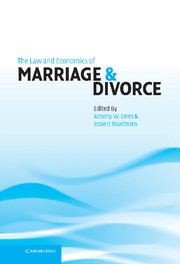Book contents
- Frontmatter
- Contents
- List of tables and figure
- List of contributors
- 1 Introduction
- 2 Marriage: the long-term contract
- 3 Marital commitment and the legal regulation of divorce
- 4 Mutual consent divorce
- 5 An economic approach to adultery law
- 6 Louisiana's covenant marriage law: recapturing the meaning of marriage for the sake of the children
- 7 Cohabitation and marriage
- 8 Marriage as a signal
- 9 For better or for worse? Is bargaining in marriage and divorce efficient?
- 10 Weak men and disorderly women: divorce and the division of labor
- 11 The impact of legal reforms on marriage and divorce
- 12 European divorce laws, divorce rates, and their consequences
- Index
- References
7 - Cohabitation and marriage
Published online by Cambridge University Press: 13 August 2009
- Frontmatter
- Contents
- List of tables and figure
- List of contributors
- 1 Introduction
- 2 Marriage: the long-term contract
- 3 Marital commitment and the legal regulation of divorce
- 4 Mutual consent divorce
- 5 An economic approach to adultery law
- 6 Louisiana's covenant marriage law: recapturing the meaning of marriage for the sake of the children
- 7 Cohabitation and marriage
- 8 Marriage as a signal
- 9 For better or for worse? Is bargaining in marriage and divorce efficient?
- 10 Weak men and disorderly women: divorce and the division of labor
- 11 The impact of legal reforms on marriage and divorce
- 12 European divorce laws, divorce rates, and their consequences
- Index
- References
Summary
Introduction
Simple cohabitation occurs when a man and woman live together as though married but without completing any recognized marriage ceremony or meeting the requirements for common law marriage, where this exists. This least formal relationship has been growing in significance over recent decades. Such a quasi-married state carries fewer of the legal obligations that characterize marriage. In England there has been no legal recognition of common law marriage since an Act of Parliament of 1753. Among other things, this implies that one, home-owning, cohabiting party could eject another from a shared home without there being any claim on its value or services, although this position is currently under review by the Law Commission. In other countries, for example in some American states and in continental Europe, greater legal recognition of cohabitation is nonetheless usually limited compared with marriage. Where US states have recognized cohabitation contracts (for example, awarding “palimony” upon separation) as in Marvin v. Marvin (1976), they have done so under contract rather than family law.
Several questions are of great interest. Why would some men and women deliberately seek a set of lesser obligations towards each other? Is the trend towards cohabitation in some sense therefore supportive of the welfare of these couples? In that case, the trend might be judged to be efficient. Alternatively, are there barriers to marriage that could be removed to everybody's benefit? Finally, what is an appropriate response for the state, given the growth in cohabitation?
- Type
- Chapter
- Information
- The Law and Economics of Marriage and Divorce , pp. 118 - 131Publisher: Cambridge University PressPrint publication year: 2002
References
- 4
- Cited by



